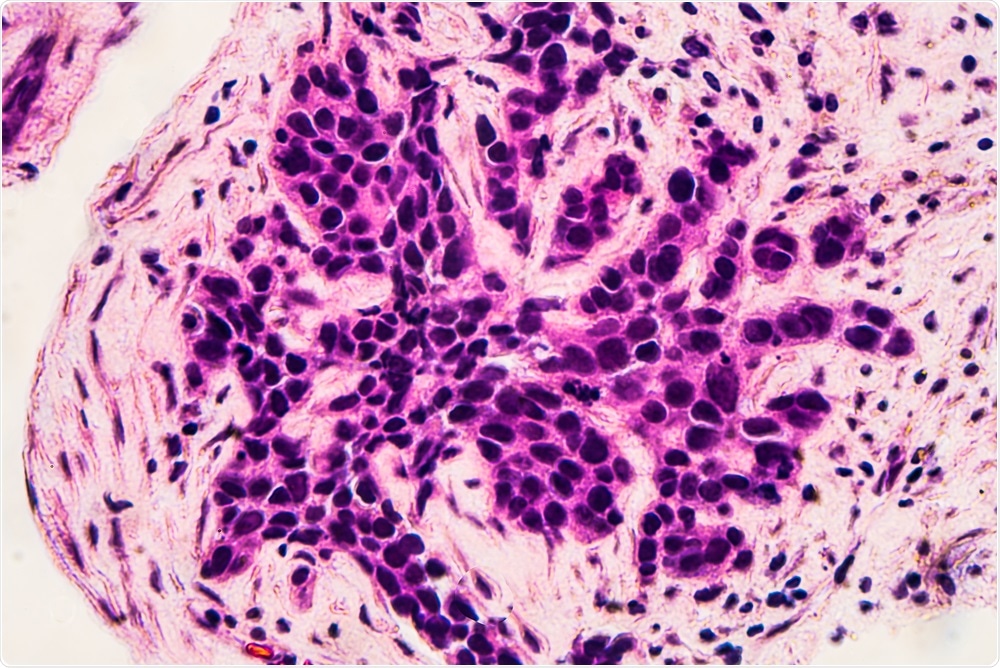A new research work, headed by scientists from Baylor College of Medicine, has revealed a new role of the steroid receptor coactivator 3, also called SRC-3/NCOA3. This protein is critical for the function of steroid hormones and serves as a prognostic marker for various cancers, including aggressive human breast cancer.

Breast Cancer. Image Credit: David A Litman/Shutterstock.com
The researchers found that SRC-3 also controls human immune T regulatory cells, or Tregs, which play a key role in the mediation of the body’s immunological activity by inhibiting the activity of other immune cells, such as those involved in combating cancer.
Published in the Scientific Reports journal, the study demonstrated that Tregs, in which the SRC-3 function was removed, did not inhibit the activity of other immune cells in the laboratory.
According to the study authors, their discoveries may help in the fight against cancer in the days to come by leading to novel strategies. Such strategies would suppress the activity of Tregs which thus would cause the immune to attack the tumors.
Tregs play an important role by suppressing immune activity that can potentially harm the body. For instance, Tregs are critical to prevent autoimmunity, an immune response directed against normal tissues of a person, which can lead to severe disease.”
Dr Bert O’Malley, Study Co-Corresponding Author, Chancellor, and Professor of Molecular and Cellular Biology, Baylor College of Medicine
Besides this, breast cancer and other kinds of cancers include infiltrating immune cells that can play a role in the regulation of tumor growth or, conversely, promote the local suppression of immune activity that would favor the growth of tumors.
The infiltration of Tregs has been experimentally demonstrated in breast tumor biopsies and corresponds with poor prognosis and decreased patient survival.
Dr O’ Malley’s lab is the leader in SRC-3 research. SRC-3 is well-known for its role in cancer formation and proliferation, but we wondered what role it would play in immune T cells. A review of bioinformatics data revealed that SRC-3 is highly expressed in Tregs and this encouraged us to pursue this study.”
Dr Bryan Nikolai, Study Co-First Author and Adjunct Assistant Professor molecular and Cellular Biology, Baylor College of Medicine
Dr Nikolai is also a senior scientist at CooperGenomics.
According to Dr Prashi Jain, the co-first author of the study and instructor of molecular and cellular biology at Baylor College of Medicine, “We experimentally show that SRC-3 is significantly enriched in both murine and human Tregs. Working with human Tregs, we used our small molecule inhibitor SI-2 to effectively inhibit SRC-3 in Tregs. As a result, Tregs greatly reduced their ability to inhibit the activation of other immune cells that help in maintaining antitumor immunity.”
Previously, the O’ Malley laboratory had demonstrated that SI-2 removes SRC-3 in breast cancer cells and, thus suppresses the growth of tumors in a mouse model of breast cancer.
Now that we know that SRC-3 also plays a key role in the immune system, I am excited to see whether our SRC-3 small molecule inhibitors might provide a dual benefit, eliminating cancer cells directly and also blocking the suppressive activity of Tregs, like killing two birds with one stone.”
Dr David Lonard, Study Co-Author and Associate Professor of Molecular and Cellular Biology, Baylor College of Medicine
Dr. Lonard is also a member of the Dan L Duncan Comprehensive Cancer Center at Baylor College of Medicine.
O’s Malley, who is also a member of Dan L Duncan Comprehensive Cancer Center at Baylor College of Medicine, concluded, “There is a great deal of interest in finding ways to inhibit Tregs that suppress the immune system. We are excited about the possibility that our approach with small molecule inhibitors might lead to promising therapies in the future. If we can remove the suppressive effect Tregs have in anticancer immune response with our small molecule inhibitors, the immune system then would be free to go after the tumor.”
Source:
Journal reference:
Nikolai, B. C., et al. (2021) Steroid receptor coactivator 3 (SRC-3/AIB1) is enriched and functional in mouse and human Tregs. Scientific Reports. doi.org/10.1038/s41598-021-82945-3